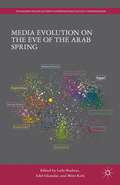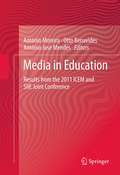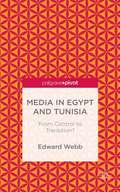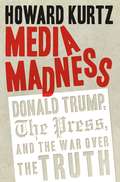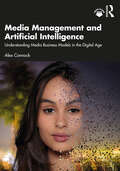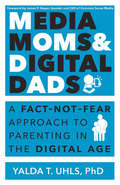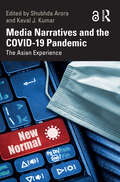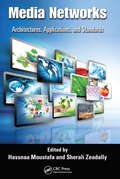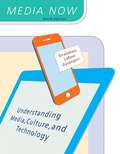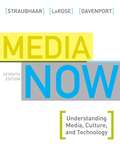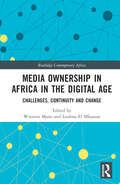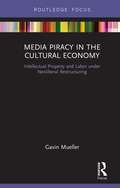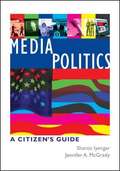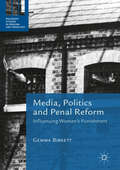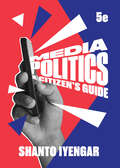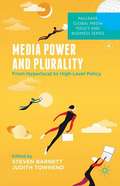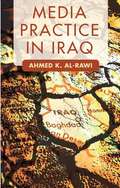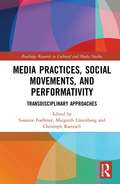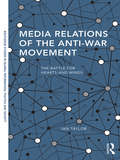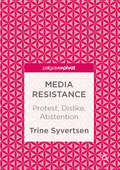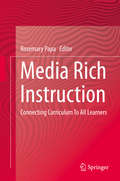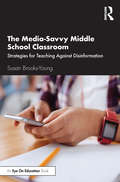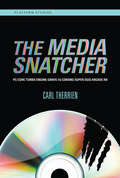- Table View
- List View
Media Events: A Critical Contemporary Approach
by Bianca Mitu Stamatis PoulakidakosMedia Events: A Critical Contemporary Approach proposes an interdisciplinary and multicultural approach of Dayan and Katz's theory of media events (1992) by applying it to contemporary situations. The contributing authors come from a range of countries (UK, USA, Mexico, Germany, Finland, Italy, Greece, Portugal, Ukraine) and analyse the theory of media events from different perspectives, incorporating social media and offering a re-positioning of Dayan and Katz's theory of media events. By bringing new perspectives into this field, the proposed volume is an important contribution as it grounds the intervention and rethinking of the theory into further empirical research. This volume has the potential to function as a 'cross-generational' link between one of the 'early classics' of media and communication studies on the one hand and the present generation of researchers on the other.
Media Evolution On The Eve Of The Arab Spring
by Leila Hudson Adel Iskandar Mimi KirkMedia Evolution on the Eve of the Arab Spring brings together some of the most celebrated and respected names in Arab media research to reflect on the communication conditions that preceded and made the Arab uprisings possible.
Media in Education
by Antonio Jose Mendes António Moreira Otto BenavidesWith the aim of discussing "old" and "new" teaching technologies, based on research and on the strategies and praxis of the use of technologies and methodologies in the different teaching levels, and also embracing the contribution and active participation of researchers, teachers, creators, managers and other specialists, the work will provide inputs on the following topics: Students' perspectives on media in the classroom, Students and media (as content and as tools for learning), Educational Media Design, Institutional Impact of the integration of Educational Media, Old v. New Media: what really matters, Research and Evaluation, Personal and/or social learning environments/networks, Media and inclusion, Media and informal learning, Immersive learning environments, Virtual mobility in Education, Mobile learning, Media and literacies
Media in Egypt and Tunisia: From Control to Transition?
by Edward WebbThis book examines the mass media systems of Egypt and Tunisia under the pre-uprising regimes, with a focus on the last decade of the Mubarak and Ben Ali periods, as well as on how media are adapting to the political transitions underway. Findings are based on extensive interviews with journalists.
Media Madness: Donald Trump, the Press, and the War over the Truth (Regnery Publishing Ser.)
by Howard Kurtz"‘Defiance Disorder’: Another new book describes chaos in Trump’s White House"–Ashley Parker, Washington Post According to the media, Donald Trump could never become president. Now many are on a mission to prove he shouldn’t be president. The Trump administration and the press are at war—and as in any war, the first casualty has been truth. Bestselling author Howard Kurtz, host of Fox News’s Media Buzz and former Washington Post columnist, offers a stunning exposé of how supposedly objective journalists, alarmed by Trump’s success, have moved into the opposing camp. Kurtz’s exclusive, in-depth, behind-the-scenes interviews with reporters, anchors, and insiders within the Trump White House reveal the unprecedented hostility between the media and the president they cover.In Media Madness, you’ll learn: Why White House strategist Steve Bannon told Trump he is in danger of being impeached How the love-hate relationship between the president and Morning Joe hosts—Joe Scarborough and Mika Brzezinski—turned entirely to hate How Kellyanne Conway felt betrayed by journalists who befriended her—and how she fought backHow elite, mainstream news reporters—named and quoted—openly express their blatant contempt for Trump How Bannon tried to block short-lived Communications Director Anthony Scaramucci—and why Trump soured on himHow Ivanka and Jared Kushner aren’t the liberals the pundits want them to be—and why Trump tried to discourage them from joining the White House Why Trump believes some journalists harbor hatred for him—and how some liberals despise his voters How Trump is a far more pragmatic politician than the press often acknowledges (and how the press dismisses his flip-flops when he flops their way) What Trump got wrong about Charlottesville—and how Steve Bannon predicted the debacle How the media consistently overreached on the Russian “collusion” scandal Why Trump actually likes journalists, secretly meets with them, and allows the press unprecedented access Why Reince Priebus couldn’t do his job—and the real reason he left the White House How Sean Spicer privately berated journalists for bad reporting—and why he and Kellyanne Conway were relentlessly attacked by the mediaNever before has there been such an eye-opening, shocking look at what the White House and the media think about each other. It’s not pretty. But it also makes for the most important political book of the year.
Media Management and Artificial Intelligence: Understanding Media Business Models in the Digital Age
by Alex ConnockThis cutting-edge textbook examines contemporary media business models in the context of Artificial Intelligence (AI) and digital transformation. AI has dramatically impacted media production and distribution, from recommendation engines to synthetic humans, from video-to-text tools to natural language models. "AI is really the change agent of the media industry," answered a natural language generation model when AI was ‘asked’ about the subject of this book. "It will open incredible opportunities." This book seeks to explore them. The media is examined through four sections. ‘Principles’ maps business models and the key tools of AI. ‘Platforms’ covers distribution channels in Games, Streamers, Social Networks, Broadcast and Digital Publishing. ‘Producers’ covers the engines of content-making, including Scripted, Entertainment, Factual, Content Marketing, Creators and Music. Finally, ‘Pioneers’ covers emerging sectors of Podcasting, Esports, the Metaverse and other AI-driven developments. Then in each chapter, a standard value creation model is applied, mapping a single sector through development, production, distribution and monetisation. Diverse case studies are analysed from India, Nigeria, South Korea, South Africa, France, the Netherlands, the US, the UK, Denmark and China – around creative entrepreneurship, revenue models, profit drivers, rights and emerging AI tools. Questions are provided for each case, whilst chapter summaries cement learning. Applied and technology-focused, this text offers core reading for advanced undergraduate and postgraduates studying Media Management – or the relationship between Entertainment, Media and Technology. Online resources include chapter-by-chapter PowerPoint slides and an Instructor’s Manual with further exercises and case studies.
Media Moms and Digital Dads: A Fact Not Fear Approach to Parenting in the Digital Age
by Yalda T. UhlsA new media was unleashed upon the world and children took to it like ducks to water. Young people everywhere devoured its content, spending hours upon end immersed in it, while simultaneously ignoring the adults in their lives. Parents were understandably alarmed and worried that this new media was ruining young minds. It may surprise you to know that this new media was not the Internet, radio, or television but rather the 19th-century novel. Yes, parents were concerned that reading too much Jane Austin was going to ruin their children. Fast-forward to today and we are still having the same conversation. Will digital media, in its various forms, ruin our children? In Media Moms & Digital Dads, former film producer turned child psychologist Yalda Uhls cautions parents not to be afraid of the changing state of media but to deal with the realities of how our kids engage with it. The truth is children today spend more time with media than they do with parents or in schools. And as parents, many of us did not have early exposure to the Internet, mobile phones, and gaming, making the world of our children somewhat foreign to us. The key, says Uhls, is to understand the pros and cons of media so that parents can make informed decisions about cause and effect, boundaries and exposure. Uhls debunks the myths around media by delving into the extensive body of social science research, proving that our kids are all right, and that parents can and must adapt to help their children thrive in the digital age. This ground-breaking book will draw back the curtain and reveal the truth-often surprising and counterintuitive, and other times reassuring-in order to help guide the conversation about our digital age and the future of childhood.
Media Narratives and the COVID-19 Pandemic: The Asian Experience
by Shubhda Arora Keval J. KumarThis volume investigates mediated lives and media narratives during the Covid-19 pandemic, with Asia as a focus point. It shows how the pandemic has created an unprecedented situation in this globalized world marked by many disruptions in the social, economic, political, and cultural lives of individuals and communities— creating a ‘new normal’. It explores the different media vocabularies of fear, panic, social distancing, and contagion from across Asian nations. It focuses on the role media played as most nations faced lockdowns and unique challenges during the crisis. From healthcare workers to sex workers, from racism to nationalism, from the plight of migrant workers in news reporting to state propaganda, this book brings critical questions confronting media professionals into focus. The volume is of critical interest to scholars and researchers of media and communication studies, politics, especially political communication, social and public policy, and Asian studies.
Media Narratives and the COVID-19 Pandemic: The Asian Experience
by Shubhda Arora Keval J. KumarThis volume investigates mediated lives and media narratives during the Covid-19 pandemic, with Asia as a focus point. It shows how the pandemic has created an unprecedented situation in this globalized world marked by many disruptions in the social, economic, political, and cultural lives of individuals and communities— creating a ‘new normal’. It explores the different media vocabularies of fear, panic, social distancing, and contagion from across Asian nations. It focuses on the role media played as most nations faced lockdowns and unique challenges during the crisis. From healthcare workers to sex workers, from racism to nationalism, from the plight of migrant workers in news reporting to state propaganda, this book brings critical questions confronting media professionals into focus.The volume is of critical interest to scholars and researchers of media and communication studies, politics, especially political communication, social and public policy, and Asian studies.
Media Networks: Architectures, Applications, and Standards
by Hassnaa Moustafa Sherali ZeadallyA rapidly growing number of services and applications along with a dramatic shift in users' consumption models have made media networks an area of increasing importance. Do you know all that you need to know?Supplying you with a clear understanding of the technical and deployment challenges, Media Networks: Architectures, Applications, and Standard
Media Now: Understanding Media, Culture, And Technology (Mindtap Course List Series)
by Joseph Straubhaar Lucinda Davenport Robert LaRoseOffering the most current coverage available, MEDIA NOW: UNDERSTANDING MEDIA, CULTURE, AND TECHNOLOGY, 9e equips readers with a thorough understanding of how media technologies develop, operate, converge, and affect society. The text provides a comprehensive introduction to today's global media environment and ongoing developments in technology, culture, and critical theory that continue to transform the rapidly evolving industry−and impact your daily life. Focusing on the essential history, theories, concepts, and technical knowledge, MEDIA NOW develops readers' media literacy skills to prepare them for work in the expanding fields of the Internet, interactive media, and traditional media industries. In addition to vivid infographics and illustrations, the cutting-edge Ninth Edition includes the latest developments and trends in social media, e-publishing, policy changes for Internet governance, online privacy protection, online ad exchanges, the changing video game industry, and much more.
Media Now: Understanding Media, Culture, and Technology
by Joseph Straubhaar Robert Larose Lucinda DavenportMEDIA NOW, Seventh Edition, empowers you to think critically about the media and its effects on culture by providing a thorough understanding of how media technologies develop, operate, converge, and affect society. MEDIA NOW prepares you for encounters in the expanding fields of the Internet, interactive media, and traditional media industries through engaging, up-to-date material that covers the essential history, theories, concepts, and technical knowledge you need to thrive. Extensively updated in a new sixth edition, MEDIA NOW provides a comprehensive introduction to today's global media environment and ongoing developments in technology, culture, and critical theory that continue to transform this rapidly evolving industry and affect our daily lives.
Media Ownership in Africa in the Digital Age: Challenges, Continuity and Change (Routledge Contemporary Africa)
by Winston Mano Loubna El MkaouarWho owns the media and communications in Africa today and with what implications? The book elegantly answers this urgent question by unpacking multiple dimensions of media ownership through rare and authoritative perspectives, including both historical and contemporary digital developments. It traces the evolving forms of ownership of media and communications in specific African contexts, showing how they interact with broader changes in and outside the continent. The book also shows how Big Techs, such as Meta (formerly known as Facebook), are involved in a scramble for Africa’s digital ecosystem and how their advance brings both opportunities and concerns about ownership and control. The chapters analyse evolving forms of ownership and their implications on media concentration and democracy across Africa. The book offers a nuanced account of how media ownership structures are in some instances captured with an ever-growing and complex ecosystem that also has new opportunities for public interest media. Offering a significant representation of the trends and diversity of existing media systems, the book goes beyond the postcolonial geographical divisions of North and Sub-Saharan Africa to highlight common patterns and significant similarities and differences of communications ownerships between and within African countries. The contributors expose media and communications ownership patterns in Africa that are centralised and yet decentralising and in some cases, battling, resurging and globalising.
Media Piracy in the Cultural Economy: Intellectual Property and Labor Under Neoliberal Restructuring (Routledge Focus on Digital Media and Culture)
by Gavin MuellerThis book takes a Marxist approach to the study of media piracy – the production, distribution, and consumption of media texts in violation of intellectual property laws – to examine its place as an endemic feature of the cultural economy since the rise of the Internet. The author explores media piracy not in terms of its moral or legal failings, or as the inevitable by-product of digital technologies, but as a symptom of a much larger restructuring of cultural labor in the era of the Internet: labor that is digital, entrepreneurial, informal, and even illegal, and increasingly politicized. Sketching the contours of this new political economy while engaging with theories of digital media, both critical and celebratory, Mueller reveals piracy as a submerged social history of the digital world, and potentially the key to its political reimagining. This significant contribution to the study of piracy and digital culture will be vital reading for scholars and students of critical media studies, cultural studies, political theory, or digital humanities, and particularly those researching media piracy, digital labor, the digital economy, and Marxist theory.
Media Politics: A Citizen's Guide
by Shanto Iyengar Jennifer McgradyIyengar and McGrady (Stanford U.) provide a text that discusses the rise of media-based politics in the US, how the media affects American politics, and how politicians use it to their advantage. Campaigning, public relations tactics, and the effects of media on the general public are also detailed. Annotation ©2007 Book News, Inc., Portland, OR (booknews.com)
Media, Politics and Penal Reform
by Gemma BirkettThis book examines the nature of relations between penal reform campaigners, journalists and policymakers at the crime-media nexus. With a particular focus on women's penal policy, Birkett uncovers how reform strategies have augmented and developed under changing governments and the news media spotlight. While penal reformers have traditionally relied on the language of humanitarianism to influence the direction of policy, there remains an array of political and cultural sticking points. With a policy-focused orientation, this study provides a number of pragmatic and practical tips for those wishing to think more strategically about their ability to influence politicians, the media and the public. With unprecedented access to over thirty policy elites working around Westminster and Whitehall during the development of the Corston agenda (and beyond), this engaging and timely work exposes the triumphs and tribulations of such actors for the very first time.
Media Politics (Fifth Edition)
by Shanto IyengarA current perspective from a leading scholar This significant revision shows how current issues like the normalizing of “alternative facts,” the management of the COVID-19 crisis, the 2020 election and Trump’s exit from office, and the proliferation of social media fit into a larger understanding of political communication. Shanto Iyengar, a leading scholar in the field, makes contemporary research accessible and engaging with new examples and data throughout. No book illuminates more clearly how media influences politics and how politicians use media to get elected, stay in power, and achieve policy goals. This purchase offers access to the digital ebook only.
Media Power and Plurality
by Steven BarnettDemocratic governments throughout the world aspire to plurality and diversity of voice as a policy goal, which is fundamental to a healthy democracy. Over the last 20 years, however, economics, technology, political ideology and global corporate power have often conspired to frustrate those normative aims. More recently, different plurality problems have been prompted by access issues and the burgeoning reach and power of digital intermediaries such as Google, Facebook and Amazon. While some countries, such as the UK and US, have seen little creative activity from policy makers, other countries have sought to explore new approaches to funding and to exploit new technologies at both national and local level. This edited collection, featuring international scholars from a range of disciplines, examines contemporary and emerging policy issues around media plurality from grassroots local initiatives to high-level policy debates in both mature and emerging democracies, in each case drawing out generalizable initiatives and ideas for policy thinking in an increasingly complex area.
Media Practice in Iraq
by Ahmed K. Al-RawiA historical survey of the Iraqi media from its beginning up to the present day, focusing on the post-2003 media scene and the political and societal divisions that occurred in Iraq after US-led occupation. Investigates the nature of the media outlets and offers an analysis of the way Iraqi satellite channels covered the 2010 general elections.
Media Practices, Social Movements, and Performativity: Transdisciplinary Approaches (Routledge Research in Cultural and Media Studies)
by Susanne Foellmer Margreth Lünenborg Christoph RaetzschAs individuals incorporate new forms of media into their daily routines, these media transform individuals’ engagement with networks of heterogeneous actors. Using the concept of media practices, this volume looks at processes of social and political transformation in diverse regions of the world to argue that media change and social change converge on a redefinition of the relations of individuals to larger collective bodies. To this end, contributors examine new collective actors emerging in the public arena through digital media or established actors adjusting to a diversified communication environment. The book offers an important contribution to a vibrant, transdisciplinary, and international field of research emerging at the intersections of communication, performance and social movement studies.
Media Relations of the Anti-War Movement: The Battle for Hearts and Minds (Routledge Studies in Global Information, Politics and Society)
by Ian TaylorIn this book, Ian Taylor examines how a social movement, the anti-Iraq War movement in the UK, engaged with the media as a part of their campaigning against the invasion and occupation of Iraq. Moving beyond content analysis to draw upon interviews with locally based journalists and activists, Taylor examines how locally based anti-war groups engaged with their local press, as well as how those groups were reported on by the local press in their respective areas. In the process of exploring these ideas, the book takes on questions like: How did local journalists assess the legitimacy of the anti-war movement? How, why, and to what extent did opponents of the war pursue local press coverage? What bearing did the social composition of the movement have on the way they set about engaging with the media? How did the local press handle the controversy surrounding opposition to military action against Iraq? Media Relations of the Anti-War Movement makes a unique contribution to research on the interactions between social movements and the media and plugs a major gap in the literature on the Iraq War and the media.
Media Resistance
by Trine SyvertsenThis book is open access under a CC BY license. New media divide opinion; many are fascinated while others are disgusted. This book is about those who dislike, protest, and try to abstain from media, both new and old. It explains why media resistance persists and answers two questions: What is at stake for resisters and how does media resistance inspire organized action? Despite the interest in media scepticism and dislike, there seems to be no book on the market discussing media resistance as a phenomenon in its own right. This book explores resistance across media, historical periods and national borders, from early mass media to current digital media. Drawing on cases and examples from the US, Britain, Scandinavia and other countries, media resistance is discussed as a diverse phenomenon encompassing political, professional, networked and individual arguments and actions. di
Media Rich Instruction
by Rosemary PapaE-learning has brought an enormous change to instruction, in terms of both rules and tools. Contemporary education requires diverse and creative uses of media technology to keep students engaged and to keep up with rapid developments in the ways they learn and teachers teach. Media Rich Instruction addresses these requirements with up-to-date learning theory and practices that incorporate innovative platforms for information delivery into traditional areas such as learning skills and learner characteristics. Experts in media rich classroom experiences and online instruction delve into the latest findings on student cognitive processes and motivation to learn while offering multimedia classroom strategies geared to specific curriculum areas. Advances such as personal learning environments, gamification, and the Massive Open Online Course are analyzed in the context of their potential for collaborative and transformative learning. And each chapter features key questions and application activities to make coverage especially practical across grade levels and learner populations. Among the topics included: Building successful learning experiences online. Language and literacy, reading and writing. Mathematics teaching and learning with and through education technology. Learning science through experiment and practice. Social studies teaching for learner engagement. The arts and Technology. Connecting school to community. At a time when many are pondering the future of academic standards and student capacity to learn, Media Rich Instruction is a unique source of concrete knowledge and useful ideas for current and future researchers and practitioners in media rich instructional strategies and practices.
The Media-Savvy Middle School Classroom: Strategies for Teaching Against Disinformation
by Susan Brooks-YoungThe Media-Savvy Middle School Classroom is a practical guide for teachers of Grades 5-8 who want to help their students achieve mastery of media literacy skills. Today’s fake news, alternative facts, and digital manipulations are compromising the critical thinking and well-being of middle grade learners already going through significant personal changes. This actionable book prepares teachers to help their students become informed consumers of online resources. Spanning correct source use, personal versus expert opinions, deliberate disinformation, social media, and more, these ready-to-use activities can be integrated directly into existing language arts and mathematics lesson plans.
The Media Snatcher: PC/CORE/TURBO/ENGINE/GRAFX/16/CDROM2/SUPER/DUO/ARCADE/RX (Platform Studies)
by Carl TherrienAn in-depth exploration of a neglected video game platform of the 1990s and a reflection on the way we construct the cultural history of video games.In The Media Snatcher, Carl Therrien offers an in-depth exploration of NEC's PC Engine/TurboGrafx-16, a little-studied video game platform released in the late 1980s. The PC Engine was designed to bring technological expandability to the world of game consoles; The Media Snatcher's subtitle evokes some of the expansions and the numerous rebranded versions of the system released by NEC, including the first CD-ROM add-on in video game history. The platform makers hoped that expandability would allow its console to remain at the cutting edge and even catch up with such perceptually rich media as cinema and anime. More than a simple shape-shifter, the PC Engine became a media snatcher.Therrien examines the multidirectional interactions of video game technologies, commercial structures, and cultural dynamics. He considers, among other things, hyperbolic marketing and its impact on how we construct video game history; glitches, technological obsolescence, and the difficulty of conducting media archaeology of the recent past; the emergence of male-centered power fantasies through audiovisual rewards; the rise of original genres such as visual novels; and the sustained efforts to integrate PC Engine software in the sprawling media landscape of Japan (where the PC Engine found much of its success). Avoiding the usual techno-industrial glorification, Therrien recounts the bold technological aspirations of the platform makers and the struggles to make the actual technology realize its potential.

